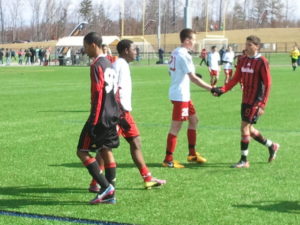The 10 best reasons to say no to the high-pressure travel team invite

 (Originally published in 2015)
(Originally published in 2015)
Yes, we want to support our kids. Yes, we want them to have the best chance for success.
But in today’s you-get-what-you-pay-for environment, it pays to remember that sometimes you can get more for less.
+READ: LeBolt: How to build a successful travel team without ever cutting a player
Here are 10 advantages of the lower-pressure travel team to consider before forking over all that dough for the pricey alternative.* Way more than a watered-down version of the A-team, coach Chas Sumser has added comments (italicized) which show how he kept things “low pressure” but still “high performance” with high expectations.
- The soccer is a stress-reliever rather than a stress-inducer. Loaded down with advanced placement courses, IB curriculum, peer pressure and responsibilities at home, it’s nice to have an outlet rather than an amplifier. Make the field a sanctuary that’s challenging, yet free from stress.
 There is time to discover other interests and to pursue other passions. If they’re intent on vet school and really need to hit the books, they’ll make more headway with a few less ‘mandatory’ practices. Sports is an important thing, but it’s not the only thing.
There is time to discover other interests and to pursue other passions. If they’re intent on vet school and really need to hit the books, they’ll make more headway with a few less ‘mandatory’ practices. Sports is an important thing, but it’s not the only thing.- Friendships are easier when they’re not frazzled by the battle for a starting spot. Nothing ruins a relationship faster than a friendly slide tackle from behind. It’s just easier to have someone’s back when you’re not having to watch your own. Those friendships are much easier to sustain when you don’t have the volatility of team shuffling and player placement. It’s just tough to stay friends when you are teammates one season and archrivals the next.
- You always get playing time, even when you come late, and especially if you’re short a player that day. Then they’re REALLY glad you to see you. In fact, they’re glad you came at all. Understand absence and expect commitment. I always emphasized the responsibility each player has to the team. Coming late — or not showing up at all — was not something I accepted easily if it was pervasive. Consistent tardiness or absence is one of the few reasons that I would not ask a player to return.
- You can quit and you’re still welcomed back (probably). Everyone wants to belong, and there’s great security in knowing, no matter how we part ways, you’ll always have a place to come home to. Players on my team were very loyal to each other, but they needed to be able to count on their teammates first and foremost. A player who quit could come back and play again, but it wasn’t perfectly easy every time, especially after a season where we struggled to win games. Winning wasn’t a high priority, but trying to win always was.
-
 You’re forgiven when you make a mistake rather than blamed for the loss. Players feel plenty bad about letting in the winning goal. Nothing makes bad feel better like the smile of a teammate who says, “It’s okay,” and means it. You win as a team and you lose as a team.
You’re forgiven when you make a mistake rather than blamed for the loss. Players feel plenty bad about letting in the winning goal. Nothing makes bad feel better like the smile of a teammate who says, “It’s okay,” and means it. You win as a team and you lose as a team. - Team events can be generous affairs since you haven’t spent the social budget on extended travel, hotel stays and per-diem meals. Team events become traditions rather than one-off end of season formalities. We never had any events that I would call lavish. We had tons of nice parties and sleepovers, etc., but they all came from the goodness of the hearts of the parents and families.
- Everybody looks forward to the annual reunions and brings their cleats, jerseys and stuff for the cookout at coach’s house. If the team time left good memories, there’s about 100 percent more chance that the last game won’t be their last game.
- When team members are diverse in personality, style, and skill, team commitment demands a sincere effort to respect, appreciate and learn to work with others who may be unlike you and may not be as athletically gifted as you are. Successful players are successful people first. If they are enabled to be the best they can be in a well-rounded way, their soccer will follow.
 Goals (in the game) are not that important, but goals in life are. Everyone should know what we are trying to achieve, as individuals and as a team. The measurement of success in life is not necessarily on the scoreboard.
Goals (in the game) are not that important, but goals in life are. Everyone should know what we are trying to achieve, as individuals and as a team. The measurement of success in life is not necessarily on the scoreboard.
Support, yes. Success, yes. Kids who can work together for the good of the team? Priceless.
+READ: Can we develop players AND children at the same time?
*My thanks to Team Leesburg FC Avalanche and Chas and Sally Sumser, their head coach and team manager, whose stories of their trials and triumphs over 17 seasons have inspired my last three columns and culminate in this post. You can still read some of Coach Chas’ favorite blog posts from the years with the Vipers and Avalanche at www.Viper.net.
SOCCERWIRE MARKETPLACE
- visitRaleigh.com Showcase Series 2025, hosted by NCFC Youth
- OFFICIAL MANCHESTER CITY SOCCER CAMPS
- Wanted Licensed Youth Soccer Coach
- Join Official Elite Summer Soccer Camps with Europe’s Top Pro Clubs!
- The St. James FC Travel Staff Coach - North (Loudoun) & South (Fairfax)
- The St. James FC Girls Academy (GA) Head Coach - 2 teams
- The St James FC Boys Travel Tryouts
- OFFICIAL BAYERN MUNICH SUMMER CAMPS U.S.
- JOIN THE ALLIANCE!
- OFFICIAL FC BARCELONA CAMPS U.S.











